|
|
|
Sort Order |
|
|
|
Items / Page
|
|
|
|
|
|
|
| Srl | Item |
| 1 |
ID:
190725
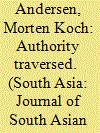

|
|
|
|
|
| Summary/Abstract |
This article is about territorial claims, authority and rights in an urban settlement or ‘bosti’ in central Dhaka. It highlights the drama of a violent encounter between a police officer and a young man, unfolding how the social ordering of urban space is (re)produced in and through authority and violence. It illustrates how situated practices of authority define who can access institutions of rights and justice, and who cannot. It concludes that claims for rights and remedies are not easy to act out when the collusion of state and non-state authority negate voice and agency and leave negotiation and equitable justice reserved for those recognised within a structure of resolution, illuminating how intimacies of violence interlink with wider political configurations and economic conditions.
|
|
|
|
|
|
|
|
|
|
|
|
|
|
|
|
| 2 |
ID:
190729
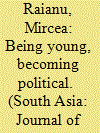

|
|
|
|
|
| Summary/Abstract |
This article discusses the relationship between political subjectivity and urban space in three novels written in the immediate aftermath of the Partition of India: Qurratulain Hyder’s My Temples, Too, Mumtaz Shah Nawaz’s The Heart Divided and Yashpal’s This Is Not That Dawn. Despite extensive thematic and structural similarities, these early Partition novels have never been considered together and through a historical lens. Each narrative features moments of reckoning when the young protagonists are faced with sudden demands to become political in a new way, for example by abandoning secular anti-colonialism for communitarianism. The diversity of their experiences and responses, from bitter resignation to open-ended struggle, reflects the difficulties of constructing unitary selves expressing deep interior convictions aligned with collective identities. These transformations of political subjectivities are situated in and shaped by the heterogeneous urban spaces of Lucknow and Lahore, which establish the conditions of possibility for coexistence and its limits.
|
|
|
|
|
|
|
|
|
|
|
|
|
|
|
|
| 3 |
ID:
190724
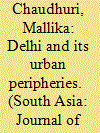

|
|
|
|
|
| Summary/Abstract |
This paper draws on the larger experience of urbanisation in two villages in Delhi, in particular the changing political and social life of these villages. Based on field research conducted between 2017 and 2019, it aims to explore the associational life of the villages and the ways in which traditional and newer forms of association and governance interact with each other and the state. In the new landscape, where panchayats operate alongside resident welfare associations and youth-led self-help organisations, a multiplicity of ‘political’ and ‘associational’ strategies have been adopted, with the invocation of terms such as ‘social work’ alongside an older invocation of biradari or community.
|
|
|
|
|
|
|
|
|
|
|
|
|
|
|
|
| 4 |
ID:
190731
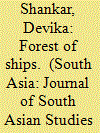

|
|
|
|
|
| Summary/Abstract |
This paper examines how the annexation of Malabar by the English East India Company in the last decade of the eighteenth century allowed the colonial administration to experiment with novel forms of state control in the region’s forests. At the same time, through a focus on the connections forged between Malabar’s forests and Bombay’s dockyards, this paper will use archival sources to examine the crucial role played by the timber monopoly introduced in 1806 in dislodging Malabar and its ports from their central position in the Indian Ocean economy and facilitating their incorporation into the margins of the emerging colonial economy.
|
|
|
|
|
|
|
|
|
|
|
|
|
|
|
|
| 5 |
ID:
190726
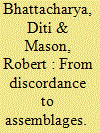

|
|
|
|
|
| Summary/Abstract |
This article examines two cities of discordant colonial heritage in India—Chandernagore, a former French colony in West Bengal, and Panjim, a former Portuguese territory in Goa—to demonstrate how these cities experience their colonial identities through heritage spaces. It explores the ways in which the museums and public spaces of these cities use memory and materiality to perform discordant colonial pasts which differ from the dominant narrative of the British Raj. Conceptualising discordance as a framework to trace the unique ways in which the museums and public heritage sites of these two cities mobilise their French and Portuguese colonial heritage, the article shows how these discordant colonial cities distinguish themselves from the British Raj and its legacies. The article affirms these differences not in terms of a duality, but a continual process of convergence and divergence that is mutually constitutive of heritage practices in the cities.
|
|
|
|
|
|
|
|
|
|
|
|
|
|
|
|
| 6 |
ID:
190722
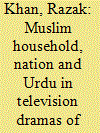

|
|
|
|
|
| Summary/Abstract |
The article explores the genealogies of Muslim cultural and Urdu language reform in late nineteenth century colonial India and traces its post-colonial trajectories in contemporary public culture in Pakistan. It does so by analysing the language and gender politics of Urdu in two Pakistani TV dramas, Aangan Terha (Crooked Courtyard), written by Anwar Maqsood and screened on the government-run Pakistan Television Corporation (PTV) channel in 1984, and Quddusi Sahab ki Bewah (The Widow of Mr. Quddusi), scripted by Faseeh Bari Khan, which was telecast on ARY Digital, a global private satellite channel, in 2012. The article emphasises the gendered language and performative politics of Urdu and respectability in colonial and post-colonial South Asia.
|
|
|
|
|
|
|
|
|
|
|
|
|
|
|
|
| 7 |
ID:
190728


|
|
|
|
|
| Summary/Abstract |
Mainstream media narratives and the official historiography of the 1984 Bhopal Gas Tragedy have overlooked the testimonies of disaster survivors, culturally discounting the authority of witnessing in both scholarly discourse and public arenas. This has left a space for novelists, as writer-activists, to trace the socio-political, economic and ecological injustices of post-colonial disasters like the Bhopal gas leak. Indra Sinha’s Animal’s People bears witness to such accounts and recreates the night of December 2–3, 1984, through the testimonies of the people surviving the gas disaster. This article identifies Sinha’s narrative technique as ‘eco-testimony’, which strategically revives hitherto undocumented survivor testimonies and their experiences of eco-social exploitation in the post-disaster environment and forges a voice of dissent against the uneven, attritional and necropolitical violence of multinational companies and their chief ally, the neocolonial nation-state.
|
|
|
|
|
|
|
|
|
|
|
|
|
|
|
|
| 8 |
ID:
190732
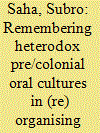

|
|
|
|
|
| Summary/Abstract |
The paper explores what a (re)organisation of the existing histories of Bangla literature from Dalit literary perspectives can offer. Towards this end, it examines some of the early questions on the formation of literary standards and how that remained directly connected with caste hierarchies. It turns briefly towards late eighteenth and early nineteenth century Calcutta as a discursive-material site to explore symptomatically how such organising of dominant literary standards works its way through various forms of exclusion. When seen from the perspective of these exclusions, what does the question of Dalit literature offer in transforming the very idea of ‘literariness’? Also, what can the vernacular literatures offer in the reception of Dalit literatures in their multiplicity while resisting the tendencies of homogenising their volatility? Addressing such concerns, the paper turns towards a conceptualisation of Bangla Dalit literature as offering a poetics for multiple forms of dwelling.
|
|
|
|
|
|
|
|
|
|
|
|
|
|
|
|
| 9 |
ID:
190730
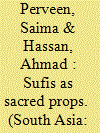

|
|
|
|
|
| Summary/Abstract |
Sufism has been subjected to reformist ideas, whether by the colonial Orientalists or the post-colonial Islamic Republic of Pakistan. This research investigates the process of colonial and post-colonial reformism through the hagiographical transmutation of a malāmatī Qādirī Sufi, Shāh Ḥusayn. It observes that the idea of colonial reformism cannot be thoroughly applied in this case—the post-colonial Pakistani state rigorously implemented its reformist policies and transmuted the saint’s image, while Western academia depicts him as queer. Therefore, the paper argues that Sufis have been used as sacred props by colonial and post-colonial reformists and scholars, resulting in multiple and contradictory Shāh Ḥusayns.
|
|
|
|
|
|
|
|
|
|
|
|
|
|
|
|
| 10 |
ID:
190723
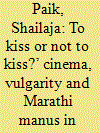

|
|
|
|
|
| Summary/Abstract |
Critiques of vulgarity, sexuality and class featured prominently in the social, cultural and intellectual life of post-Independence India. This article focuses on the discourse of chumban bandi (banning kissing) in the 1950s and 1960s Maharashtra and analyses how it became a particularly unique index of heightened transgressive pleasure. I situate this discourse within a larger public debate, where dominant caste middle-class elites took upon the responsibility to shepherd supposedly recalcitrant dominated castes and low-class masses towards decency, civilized action and citizenship. Many elites energetically worked on their ideology, which was rooted in high-caste, middle-class and patriarchal values to create Marathi manus and nation. Drawing upon hitherto neglected Marathi language texts, I show how elites policed the kiss to both ban on-screen kissing and paradoxically harness its energy to engage in the politics of Marathikaran (creating Marathi regional identity) and create a new Marathi identity as modern, moral and decent.
|
|
|
|
|
|
|
|
|
|
|
|
|
|
|
|
| 11 |
ID:
190727
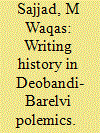

|
|
|
|
|
| Summary/Abstract |
The Deobandi-Barelvi conflict in South Asia is conventionally over religious beliefs and practices. However, it also has an earlier dimension, encompassing the early nineteenth century theological debate between Shah Ismail and Fazl-e-Haq Khairabadi. Deobandi and Barelvi polemicists rewrite this history to establish their own tradition and identity within a particular narrative of the past, linked to the family of Shah Waliullah. The Barelvis portray their founder, Ahmed Raza Khan, as belonging to the tradition of both Waliullah and Khairabadi, and against Ismail, while the Deobandis highlight Ismail’s orthodoxy. In doing so, polemicists rewrite the past and ensure that the dimension of history is a significant aspect of their conflict today as distinct oppositional identities are created.
|
|
|
|
|
|
|
|
|
|
|
|
|
|
|
|
|
|
|
|
|